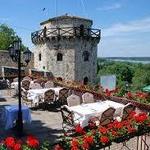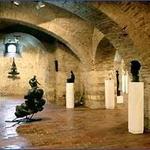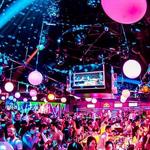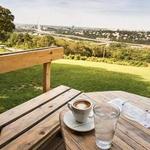Kristin & Petar
Things To Do
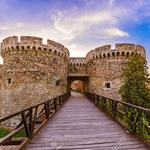
The Belgrade Fortress
The Fortress was built in stages, during the lengthy period between the 1st and 18th century, from a Roman castrum, through a Byzantine castle and the remains of the medieval capital of the Serb Despotate, all the way to an Austrian-Ottoman artillery fortification. The complex consists of the fortress itself, divided into the Upper Town (Despot’s Gate, Sahat kula - Clock Tower, Roman Well, Statue of the Victor), Lower Town (Nebojša Tower, Amam – Turkish bath, Gate of Charles VI) and the Kalemegdan Park, home to busts of important persons from Serbian history, science and culture. The Belgrade Fortress offers an exciting view of the confluence of Sava and Danube, of New Belgrade and Zemun. The Kalemegdan Park contains the “Cvijeta Zuzorić” Pavilion, the Grand Stairway, the zoo, children’s park and a number of monuments and sculptures, several sports courts, a museum, a café and a restaurant.
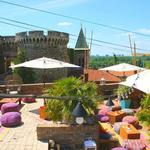
Boho Bar
Boho Bar, the lounge bar as a mix of impressions and inspiration from exotic places – Bali, Morocco, India, is the perfect spot to catch a breath while walking around the Belgrade Fortress. Even though you might be in the mood for the coffee, you will be offered one of their unique cocktails bc Serbians do happy hour at any hour of the day ;)
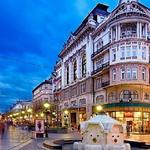
Knez Mihailova Street
Knez Mihailova Street, properly Kneza Mihaila, is the main pedestrian and shopping zone in Belgrade, and is protected by law as one of the oldest and most valuable landmarks of the city. Named after Mihailo Obrenović III, Prince of Serbia, it features a number of buildings and mansions built during the late 1870s.
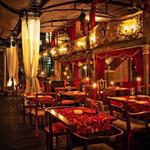
Little Bay Restaurant
Just street away from Knez Mihailova pedestrian zone, this restaurant designed in baroque theatre style can be the perfect location for the intimate lunch/dinner. Little Bay also stands out by its dedication to classical music, opera and jazz, live music formats and cross-over, and therefore is a unique venue in Belgrade, harvesting young talents and promoting them while serving an amazing food.
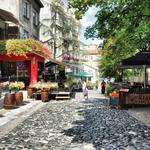
Skadarlija
There is a saying that if you haven’t visited Skadarlija you haven’t truly experienced Belgrade. Skadarlija is a vintage street in the capital of Serbia. It is located in the Belgrade municipality of Stari Grad (Old town) and generally considered the main bohemian quarter of Belgrade, similar to Paris' Montmartre. It is located in the heart of Belgrade, the old, romantic and bohemian, known in history and legend, and it lives more than a century in many songs, interesting stories and anecdotes as well as in many literary and journalistic writings. This magical part of Belgrade, beloved corner of poetry and romantic history, famous for its wooden cobbles, gas lanterns among the trees in bloom, the famous houses and taverns, where famous writers, journalists, actors, directors, musicians, singers, painters and other merry-makers spent many pleasant evenings. Our personal recommendation would be to go and visit restaurants such as Tri Sesira, Zlatan Bokal, or Dva Jelena.
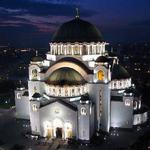
Hram Svetog Save (The Church of Saint Sava)
It is located at Vracar plateau (municipality of Belgrade), and it is considered as one of the biggest Orthodox churches in the world. It is dedicated to Saint Sava, first Serbian saint. Known as The Enlightener, was a Serbian prince and Orthodox monk, the first Archbishop of the autocephalous Serbian Church, the founder of Serbian law, and a diplomat. He did’t wanted to be a ruler, he left Serbia to become a monk, with the name Sava (Sabbas). At Athos, he established the monastery of Hilandar, which became one of the most important cultural and religious centers of the Serbian people. The Church of Saint Sava in Belgrade is dedicated to him, built where the Ottomans burnt his remains in 1594 during an uprising in which the Serbs used icons of Sava as their war flags. He is widely considered as one of the most important figures of Serbian history. Saint Sava is canonized and venerated by the Serbian Orthodox Church, as its founder, on January 27.
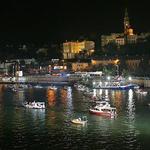
Cruise Belgrade | Belgrade Boat Tour
All In All, You Will See Over 30 Of The Most Iconic Landmarks In Belgrade. At First, The Medieval Kalemegdan Fortress. Then, The Impressive Victor Symbol. The Preserved Great War Island. The Communist Buildings Of New Belgrade. Afterward, The Beautiful Millennium Tower In Zemun. The Exclusive Belgrade Waterfront. All Eight Bridges Of The City And, In The End, The New Ada Bridge!
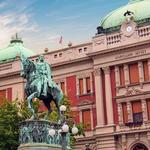
Narodni Muzej Srbije (The National Muzeum of Serbia)
The National Museum of Serbia is the largest and oldest museum in Belgrade, Serbia. It is located in the central zone of Belgrade on a square plot between the Republic Square, formerly Theatre Square, and three streets: Čika Ljubina, Vasina and Laze Pačua. Its main facade is on the Republic Square and the official address is 1a Republic Square. The museum was established on 10 May 1844. It moved into the present building in 1950, with the grand opening of the venue on 23 May 1952. Since its founding, the museum's collection has grown to over 400,000 objects, including many foreign masterpieces. The National Museum of Serbia building was declared a Monument of Culture of Great Importance in 1979.
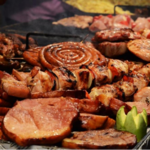
Serbian Food
When you are visiting Belgrade/Serbia it is almost impossible to avoid the most delicious food that this region has to offer. Serbian foods is deeply imbedded in the tradition and in some way you need to sample different foods in order to grasp true sense of Serbian culture. The link provides many different restaurants, targeting different prices, so we highly advise you to explore this activity to its fullest and give your senses time of their life.
